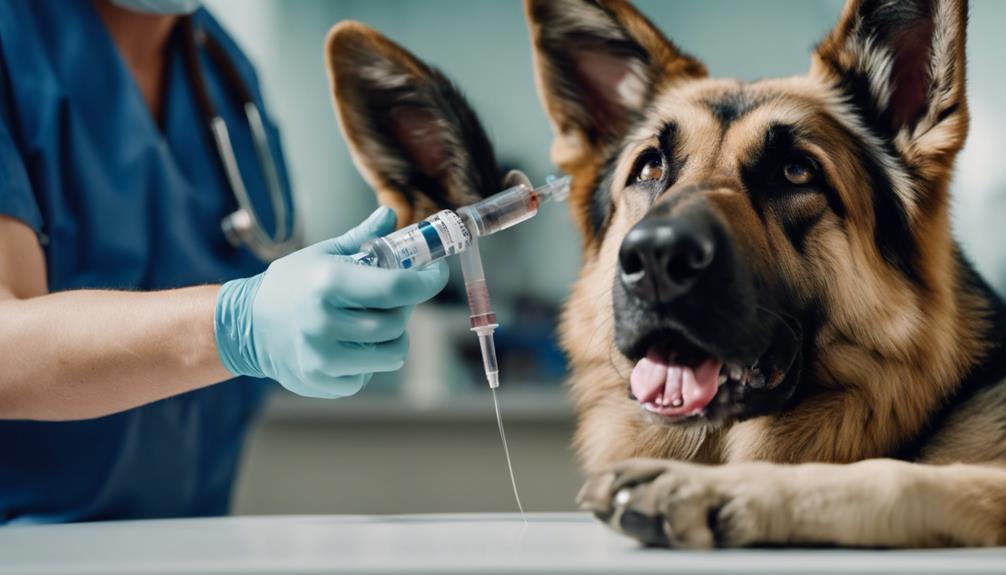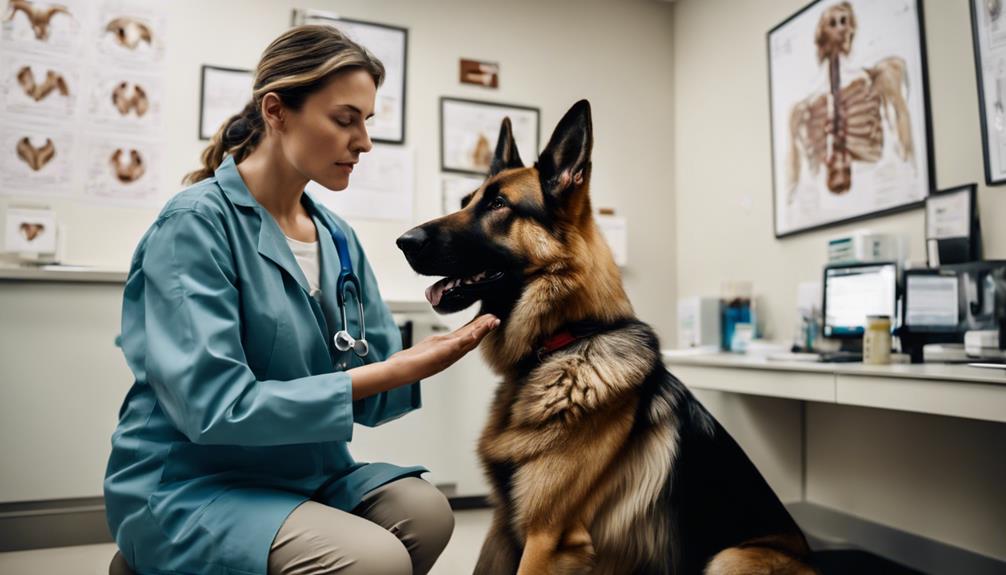🐾 Paw-some Partnership Alert! 🐾
As a pack of German Shepherd enthusiasts at MixGermanShepherd.com, we're always sniffing out the best products for our furry friends. Guess what? When you fetch something from Amazon through our links, we earn a little treat! 🦴
You may find it intriguing that German Shepherd mixes are more prone to autoimmune diseases compared to other breeds. Understanding how their immune system functions is crucial in ensuring their overall well-being. Exploring the intricacies of their immune responses and potential vulnerabilities can shed light on ways to support their health effectively. Stay tuned to uncover key insights into managing immune-related conditions in German Shepherd mixes and enhancing their quality of life.
Key Takeaways
- Genetic diversity from mixing breeds affects immune system functionality.
- Regular vet check-ups tailor vaccinations to genetic predispositions for optimal health.
- Balanced diet, exercise, and stress management are vital for immune health.
- Immune system in German Shepherd mixes requires holistic care for disease resistance.
Immune System Basics

The immune system in German Shepherd mixes functions through a complex interplay of innate and acquired defense mechanisms to protect the body from harmful pathogens. In German Shepherds, like many other breeds, this defense system is crucial for maintaining overall health. The immune system of these mixes consists of various components such as antibodies, killer cells, and chemical defenses, all working together to combat invading pathogens effectively. German Shepherd mixes inherit their immune system functionality from their parent breeds, which can influence their susceptibility to certain diseases and infections.
Understanding the immune system in German Shepherd mixes is essential for identifying potential health vulnerabilities and addressing them promptly. By providing proper care, nutrition, and ensuring vaccinations are up-to-date, you can support and strengthen your German Shepherd mix's immune system. This proactive approach can help reduce the risk of illnesses and ensure your furry companion leads a healthy and happy life.
Importance of Immune Health

Optimizing immune health in German Shepherd mixes requires a holistic approach encompassing nutrition, exercise, and regular veterinary monitoring. German Shepherd dogs inherit a unique blend of immune system traits from their parent breeds, directly impacting their overall health and disease resistance. A well-balanced diet rich in essential nutrients, coupled with regular exercise, supports the immune system of German Shepherd mixes by promoting overall health and vitality. Additionally, routine check-ups with a veterinarian are essential to monitor the immune health of German Shepherd dogs, allowing for early detection of any potential issues.
Factors such as environment, stress levels, and genetics can influence the immune system of German Shepherd mixes, making it vital to provide a supportive and nurturing environment. Understanding the intricacies of the immune system in German Shepherd dogs enables caregivers to tailor their care practices to meet the specific needs of these unique mixed breeds, ensuring their well-being and longevity. By prioritizing immune health through proactive measures, German Shepherd mixes can lead healthier and happier lives.
Common Immune System Issues

In German Shepherd mixes, common immune system issues such as allergies, autoimmune diseases, and skin conditions can significantly impact their overall health and well-being. These breeds may have weaker immune systems due to genetic predispositions inherited from their parent breeds. Monitoring for signs of immune-related disorders is crucial for maintaining the well-being of German Shepherd mixes. Regular veterinary check-ups play a vital role in early detection and management of immune system issues, ensuring prompt intervention when needed. Additionally, providing these dogs with proper nutrition, regular exercise, and a stress-free environment can help support their immune health and potentially reduce the risk of developing immune-related conditions.
- Allergies
- Autoimmune diseases
- Skin conditions
Factors Affecting Immunity

Understanding the various factors that influence immunity in German Shepherd mixes is essential for ensuring their overall health and well-being. Genetic factors play a crucial role in determining the immune system functionality of German Shepherd mixes. The genetic makeup inherited from both parent breeds can impact the dog's ability to fight off infections and diseases. Environmental factors also play a significant role in influencing the immune response in German Shepherd mix breeds. Factors such as diet quality and exposure to toxins can either strengthen or weaken the immune system. Crossbreeding in German Shepherd mixes introduces a diverse genetic pool, potentially affecting the immune system's resilience. Regular veterinary check-ups are vital for monitoring the immune health of German Shepherd mixes and addressing any underlying issues promptly. Providing proper nutrition, regular exercise, and a stress-free environment are essential elements in maintaining a robust immune system in German Shepherd mix dogs. By understanding and addressing these factors, you can help support your German Shepherd mix's immune health and overall well-being.
Diet and Immune Function

Your German Shepherd mix's diet significantly impacts their immune system functionality. Providing a well-rounded nutrition plan rich in essential vitamins, minerals, and antioxidants can enhance their immune response. Ensuring optimal gut health through high-quality proteins and essential fatty acids is crucial for supporting their immune function.
Nutritional Impact on Immunity
A balanced and nutrient-rich diet is essential for optimizing the immune function of German Shepherd mixes. Proper nutrition plays a crucial role in supporting their immune response. Key nutrients like vitamins C and E, zinc, and omega-3 fatty acids are vital for a strong immune system. To enhance immunity in German Shepherd mixes, consider the following:
- Ensure the diet includes high-quality proteins.
- Incorporate a variety of fruits and vegetables.
- Include whole grains to provide essential nutrients.
Vitamins and Antioxidants
For German Shepherd mixes, optimizing immune function through a diet rich in vitamins and antioxidants is crucial for maintaining their overall health and well-being. Vitamins such as A, C, and E play essential roles in supporting the immune system of German Shepherd mixes. Antioxidants, commonly found in fruits and vegetables, can aid in boosting their immune function and reducing the risk of autoimmune diseases. Adequate intake of vitamin E can enhance their immune response, while vitamin C promotes white blood cell function, crucial for a robust immune system. Including a variety of antioxidant-rich foods in their diet helps reduce oxidative stress and strengthens their immune defenses.
| Vitamins/Antioxidants | Role in Immune System of German Shepherd Mixes |
|---|---|
| Vitamin A | Supports immune function |
| Vitamin C | Promotes white blood cell function |
| Vitamin E | Enhances immune response |
| Antioxidants | Boosts immune function and reduces oxidative stress |
Gut Health Importance
The gut health of German Shepherd mixes significantly influences their overall immune function and well-being. A balanced diet rich in nutrients and probiotics can support a healthy gut microbiome in German Shepherd mixes. Here are three key points to consider regarding the importance of gut health in supporting the immune system of German Shepherd mixes:
- The gut is a vital component of the immune system, housing approximately 70% of immune cells within the gut lining.
- Proper digestion and absorption of nutrients in the gut are crucial for ensuring an optimal immune response in German Shepherd mixes.
- Imbalances in the gut microbiome can disrupt the immune system, making German Shepherd mixes more susceptible to infections and diseases.
Exercise and Immune Response

Engaging in regular physical activity significantly enhances the immune response of German Shepherd mixes by improving circulation and promoting lymphatic flow. Adequate exercise plays a crucial role in reducing the risk of chronic diseases and boosting overall immune function in these dogs. Through moderate-intensity activities like walks, runs, and play sessions, the immune system of German Shepherd mixes can be strengthened. Consistent exercise routines support the production of immune-boosting cells and antibodies, enhancing their ability to fight off infections and diseases effectively.
Moreover, exercise helps in managing stress levels, which can have a positive impact on the immune system of German Shepherd mixes. By engaging in physical activities, these dogs not only improve their physical fitness but also support their immune system in functioning optimally. Therefore, incorporating regular exercise into the routine of German Shepherd mixes is essential for maintaining their overall health and well-being.
Stress and Immune System

Chronic stress in German Shepherd mixes can compromise their immune system by increasing cortisol levels, which suppress immune function. This disruption affects the balance of immune cells and cytokines, impacting the overall immune response. To support a healthier immune system in German Shepherd mixes, managing stress through proper care and a stable environment is crucial.
Stress Impact on Immunity
Prolonged exposure to elevated levels of stress hormones like cortisol can significantly impair the immune response in German Shepherd mixes, compromising their ability to combat infections and diseases effectively. This can weaken their immune system, making them more vulnerable to health issues. To support the immune health of German Shepherd mixes, consider the following:
- Implement stress management techniques to reduce the impact of cortisol on the immune system.
- Provide a balanced diet rich in nutrients to help strengthen their immune response.
- Engage in regular exercise and mental stimulation to promote overall well-being and immune function.
Coping Mechanisms for Stress
Stress management plays a crucial role in maintaining the immune system health of German Shepherd mixes, influencing their susceptibility to illnesses. To help your furry friend cope with stress effectively, consider implementing the following strategies:
| Coping Mechanisms for Stress | Description |
|---|---|
| Regular Exercise | Promotes physical and mental well-being, reducing stress levels. |
| Mental Stimulation | Engaging activities that challenge your dog's mind can help alleviate stress. |
| Stable Environment | Providing a consistent and secure environment can lower stress levels. |
| Adequate Rest and Relaxation | Sufficient rest is essential for a healthy immune system under stress. |
| Balanced Diet and Training | A nutritious diet and positive reinforcement training can support immune function and reduce stress. |
Immune Responses to Stress
To maintain optimal immune function in German Shepherd mixes, understanding how stress influences their immune responses is crucial. Chronic stress can weaken their immune system, making them more vulnerable to infections and illnesses. Here are some key points to consider in relation to stress and immune responses in German Shepherd mixes:
- Stress triggers the release of cortisol, which can suppress immune responses and increase inflammation.
- Prolonged stress may disrupt the balance of immune cells and reduce antibody production.
- Behavioral changes, digestive issues, and skin problems could be signs of a compromised immune system due to stress.
Vaccinations for German Shepherd Mixes

Considering the genetic predispositions of German Shepherd mixes, tailoring vaccination schedules based on individual breed characteristics is crucial for optimizing their immune response. German Shepherd mixes may inherit immune system traits from both parent breeds, necessitating a customized approach to vaccinations. Since vaccination protocols for German Shepherd mixes should take into account their unique genetic makeup, understanding the specific health risks associated with each parent breed can guide vaccination decisions for these mixes. By tailoring vaccination schedules based on individual breed characteristics, it is possible to enhance the immune response of German Shepherd mixes and provide them with adequate protection against various diseases. It is paramount to consult with a veterinarian experienced in mixed breed health considerations when planning vaccinations for German Shepherd mixes to ensure the most effective and appropriate vaccination strategy is implemented to safeguard their health and well-being.
Supplements for Immune Support

To optimize the immune response of German Shepherd mixes, incorporating supplements such as vitamin C, E, zinc, omega-3 fatty acids, probiotics, antioxidants, and herbal remedies like echinacea and astragalus can bolster their immune system functionality. Ensuring these vital nutrients and compounds are present in your German Shepherd mix's diet can have a positive impact on their overall health and well-being. Here are three key supplements that can support the immune system of German Shepherd mixes:
- Vitamin C: Known for its antioxidant properties, vitamin C plays a crucial role in supporting the immune system and overall health.
- Omega-3 Fatty Acids: Essential for reducing inflammation and supporting immune function, omega-3 fatty acids are beneficial for German Shepherd mixes.
- Probiotics: These beneficial bacteria help maintain a healthy gut microbiome, which is closely linked to immune system health in German Shepherd mixes.
Regular Vet Check-ups

Regular vet check-ups play a crucial role in the overall health management of German Shepherd mixes. These appointments allow for the early detection of potential health issues, enabling prompt intervention and treatment. By following preventive care measures and staying proactive with check-ups, you can ensure the well-being and longevity of your German Shepherd mix.
Importance of Check-Ups
Ensuring the optimal health of German Shepherd mixes necessitates regular veterinary check-ups to monitor their well-being comprehensively. These routine visits play a crucial role in maintaining their immune system at its best capacity. During these check-ups, your veterinarian will:
- Evaluate the immune system's response to vaccinations and recommend any necessary boosters.
- Assess the overall health status to detect any signs of infection or immune-related issues early.
- Discuss potential dietary adjustments or supplements to support a robust immune response tailored to your German Shepherd mix.
Preventive Care Measures
Monitoring the overall health of your German Shepherd mix through regular veterinary check-ups is crucial for early detection of potential issues and maintaining their well-being. During these visits, your veterinarian may recommend blood tests to assess your dog's internal health. Blood tests can provide valuable information about your German Shepherd mix's immune system function, organ health, and detect any underlying conditions. By conducting routine blood tests as part of preventive care measures, your vet can identify any abnormalities early on, allowing for prompt intervention if needed. These tests play a crucial role in ensuring your dog's overall health and well-being, enabling you to address any health concerns proactively and optimize their quality of life.
Early Detection Benefits
Early detection of immune system issues in German Shepherd mixes can be facilitated through regular veterinary check-ups. These check-ups offer a proactive approach to identifying potential problems early on, allowing for timely intervention and management of immune-related conditions. By monitoring your German Shepherd mix's health status through routine visits to the vet, you can ensure that any abnormalities in the immune system are promptly addressed. Veterinarians are equipped to assess immune responses, antibody levels, and overall immune system function during these check-ups. Timely identification of immune system issues not only improves the prognosis for your furry friend but also enhances their quality of life.
- Regular vet check-ups aid in early detection
- Prompt intervention and management are possible with early detection
- Check-ups help monitor overall health and immune system function
Holistic Approaches to Immunity

To enhance the immune system of German Shepherd mixes, incorporating immune-boosting foods rich in antioxidants, vitamins, and minerals is crucial. These nutrients play a vital role in supporting the overall health and immune function of your furry companion. By providing a balanced diet that includes sources of antioxidants like blueberries, spinach, and carrots, you can help strengthen their immune response. Additionally, ensuring they receive adequate vitamins such as vitamin C and E, which are known for their immune-boosting properties, can further support their well-being.
Incorporating holistic approaches to immunity for German Shepherd mixes goes beyond nutrition. Regular exercise is essential in maintaining a healthy immune system and overall wellness. Mental stimulation through interactive play and training exercises can also contribute to a robust immune response. Managing stress levels is equally important; creating a calm environment, promoting social interaction, and offering mental enrichment activities can positively impact your German Shepherd mix's immune health. By embracing a holistic approach that encompasses nutrition, exercise, and stress management, you can support your furry friend's immune system for a healthier and happier life.
Frequently Asked Questions
Do German Shepherds Have Good Immune Systems?
You have a question about German Shepherds and their immune systems. German Shepherds generally exhibit strong immune responses attributed to their breeding history, proper care, and genetic factors. Factors like stress and vaccinations can also impact their immune health.
Do German Shepherd Mixes Have Health Problems?
You might wonder if German Shepherd mixes have health issues. They can inherit various breed-related problems. Proper health management, like regular check-ups and screenings, is crucial. Ensuring a balanced diet and exercise routine can promote overall well-being.
What Is the Best German Shepherd Mix for Protection?
For protection, a German Shepherd Doberman mix, or Doberman Shepherd, is an excellent choice. With a blend of guarding instincts from both breeds, they make loyal and reliable guardian companions when properly trained and socialized.
What Autoimmune Disease Do German Shepherds Have?
Autoimmune triggers in German Shepherds often manifest as Exocrine Pancreatic Insufficiency, Pemphigus Foliaceous, and Lupus Erythematosus. These conditions affect various organs and require immunosuppressants for management. Early detection and diligent care are crucial.
Conclusion
In conclusion, have you considered the intricate workings of your German Shepherd mix's immune system? Understanding the importance of immune health, common issues, and factors affecting immunity is crucial for their overall well-being. By focusing on diet, vaccinations, supplements, regular vet check-ups, and holistic approaches, you can help support their immune system and prevent potential health issues. Stay informed and proactive in safeguarding your furry companion's health.
